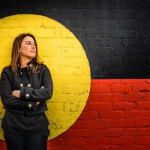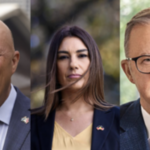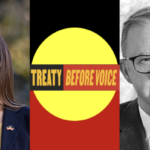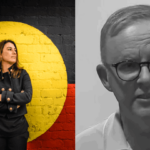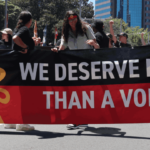Thorpe Exposes Inconvenient Truths Suppressed by the Voice Debate at the Press Club
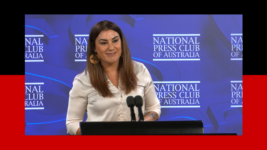
One of the greatest travesties of the Voice debate has been its suppression of one of the most vital positions against the establishment of the advisory body, which posits that it will be a powerless and poor substitute for progressing long-demanded treaty negotiations.
This line of argument termed the “progressive no vote” links to the Aboriginal Tent Embassy and the emergence of Black Power activists in inner-city state capitals in the early 1970s, and it’s currently represented in federal parliament, as the Blak Sovereign Movement, by Senator Lidia Thorpe.
Perhaps the most obnoxious example of the silencing of this progressive Black voice, is its complete erasure from the mid-July pamphlet produced by the Australian Electoral Commission, which outlines “the official” Yes and No campaign positions.
However, Thorpe went a fair way to righting this transgression, when the Gunnai, Gunditjmara, Djab Wurrung woman took the stage at the National Press Club on 16 August and made certain that either of the arguments set out in the AEC pamphlet are the result of paternalistic logic.
As the senator tells it, each side is propagating the colonial project – whether that be Dutton’s warning that the Voice will be too powerful, or Albanese’s insistence that it will be advising solely on issues that “directly affect” First Nations – as both parties deny any notion of self-determination.
Sovereignty suppressed
“The Voice is the window-dressing to constitutional recognition. We’ve rejected constitutional recognition before,” Thorpe told the club. “It is a 20-year-old Howard-era policy created with the explicit purpose of undermining sovereignty, self-determination and land rights for First Peoples.”
Then prime minister John Howard proposed holding a referendum on constitutional recognition, or recognising First Nations people in the Australian Constitution, in October 2007. This, he posited, would allow “Indigenous Australians… to enjoy the full bounty that this country has to offer”.
However, one month prior to this announcement, Howard’s government was one of only four states globally to vote against adopting the United Nations Declaration on the Rights of Indigenous Peoples (the UNDRIP): a document that specifically advances First Peoples’ rights and self-determination.
So, why would Howard seek to insert Aboriginal and Torres Strait Islander peoples into the nation’s founding document, whilst at the same time deny an international agreement attempting to promote the standing of Indigenous peoples on this continent and across the globe?
Well, as Thorpe outlined last Wednesday, “John Howard said, ‘You can’t treaty with yourself’”.
The senator’s explanation suggests that Howard supported constitutional recognition, as Dutton does today, because it would incorporate First Nation peoples into the settler colonial project to such a degree that they could no longer assert sovereign rights in contrast to it.
Calls for treaty go back decades. A treaty is an agreement established between two sovereign entities, which involves land and water rights, as well as likely reparations. And in recognising First Nations sovereignty, Australia would need to relinquish the power it’s imposed upon them.
“When we talk about sovereignty, we are talking about much more than just the romanticised spiritual notion talked about in the Uluru Statement,” Thorpe spelt out to the National Press Club audience. “We are talking about real political sovereign power.”
“That’s why the government is scared to acknowledge it.”
“A powerless advisory body”
Thorpe called out the Yes campaign for accusing the Blak Sovereign Movement, in its opposition to the Voice, as “siding with the racists” and standing in the way of progress, when, as she stressed, it’s done the opposite, as it’s assessed the Voice for the “conservative proposal” that it is.
The Voice will comprise of a group of First Nations representatives selected by government that will advise the executive and parliament “on matters relating” to Indigenous peoples. However, on receiving these suggestions, these authorities will be under no obligation to fulfill them.
“When the government of the day strategically selects which voices they want to listen to, who they want on their advisory bodies, they’re already in the process of manufacturing the consent they need to destroy Country and continue their colonial project,” Thorpe elaborated.
The senator further pointed out during her address that Indigenous affairs minister Linda Burney has already outlined to the press that she foresees her role and that of her department as guiding those representatives making up the Voice on which issues they should be addressing.
And as for the national debate that was supposed to be about progressing Aboriginal advancement, it has descended into an argument between the white men with the loudest voices: Liberal opposition leader Peter Dutton and Labor prime minister Anthony Albanese.
Indeed, the latter, the chief proponent of the Voice these days, has been spruiking the proposal by pointing out what the advisory body won’t be passing consideration upon, which can only be seen as negative outcomes for First Nations peoples.
According to Albanese, the Voice won’t provide First Nations people with the ability to issue advice on fossil fuels, climate, foreign affairs or defence, as these matters evidently don’t directly affect them. And he’s further suggested the Voice won’t lead to reparations or treaty-making.
So, rather than bringing about any mutual recognition of sovereign entities, the constitutionally enshrined Indigenous voice to parliament would serve to secure First Nations peoples in a subordinate position to their Australian masters, requesting changes on limited authorised matters.
There is a war
Thorpe makes clear that the war “came uninvited to our shores and killed 90 percent of our people”. Known as the Frontier Wars, this conflict, according to the senator, has “never ended”, but rather it plays out in different ways: “same war, different weapons, the same domination of First Peoples”.
Examples of the way it continues cited by the senator include the hugely disproportionate First Nations adult and child incarceration rates, the excessive numbers of Indigenous child removals, the continued destruction of sacred sites and the acquisition of Indigenous land via legal means.
“We should call off the referendum,” Thorpe continued. “It has caused nothing but harm and division already.”
The senator then presented five elements as a way forward for all, which begins with truth-telling, or exposure of the myths that underpin the invasion of the continent and the violent way in which the settler colonial nation of Australia was, and continues to be, established upon it.
The implementation of the recommendations of the Bringing Them Home report, an inquiry into First Nations child removals, and those of the Royal Commission into Aboriginal Deaths in Custody are the next elements, along with establishing the UNDRIP principles in Australian law.
And the last remaining element, which would lead us all towards achieving “a mature nation”, as Thorpe puts it, would be treaty-making between the government and each of the First Nations that have existed on this continent for tens of thousands of years.
“Treaty is an end to the war that was declared on us when the ships arrived. Treaty is a peace-making instrument,” said Senator Thorpe, in presenting a wholistic way forward that would see First Nations people’s determining their own futures.
“Treaty is a way for two sovereign parties to negotiate on a way forward and agree through an internationally recognised formal legal agreement.”


